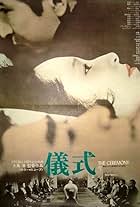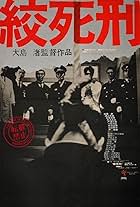IMDb RATING
6.9/10
858
YOUR RATING
A metaphysical mystery involving a university student's camera getting stolen, and the thief then committing suicide. Looking back upon the event, the situation comes to be questioned if it ... Read allA metaphysical mystery involving a university student's camera getting stolen, and the thief then committing suicide. Looking back upon the event, the situation comes to be questioned if it happened at all.A metaphysical mystery involving a university student's camera getting stolen, and the thief then committing suicide. Looking back upon the event, the situation comes to be questioned if it happened at all.
- Awards
- 1 nomination total
Photos
Storyline
Did you know
- ConnectionsFeatured in The Man Who Left His Soul on Film (1984)
Featured review
Sometimes we can begin to form judgments about a film very swiftly; occasionally our opinions may change from beginning to end, but often those early judgments will remain consistent. Maybe a film is distinctly good or bad; maybe a film exists on the same wavelength we do, such that we can appreciate it where others do not, or maybe the opposite is true. And the same holds for individual filmmakers: I've watched some works from the likes of Federico Fellini, Ingmar Bergman, Jean-Luc Godard, or Oshima Nagisa, and adored them; I've watched others and hated them, or worse, felt indifferent, or was bored. And yet - what's that line given to Lo Pan in 'Big trouble in Little China?' "Like fools, we try, try again?" I'm given to understand that 'The man who left his will on film' is regarded well amidst Oshima's movies. Even as my experience with the director has been incredibly mixed heretofore, I thought I would try again. But I shouldn't have. Frankly, I think this is rubbish, and it comes across as such from the very beginning to the very end.
There were, theoretically, some workable ideas herein. Other filmmakers have made something worthwhile of such ideas. The ready comparison that comes to mind for me, however, is Godard, who I mostly find to have been a bloviating, self-important blowhard with little of import to say either artistically or politically. Even as we may have shared some values, he tended to be all style and no substance when it came to film-making, and all hot air and no meaning when it came to politics. The resemblance I see in this flick to Godard is striking, and not in a good way; Oshima and JLG were alike in that they often excelled, in my perspective, when it came to concrete narrative fiction, but the moment they tried to be artistic or political their pictures fell flat. A line herein seems very self-referential as a character says "when you're bankrupt politically and artistically all experience loses meaning." There are some lovely shots in this, yes, a credit to both Oshima and cinematographer Narushima Toichiro. I don't know why composer extraordinaire Takemitsu Toru is involved, because his music far outpaces the content for which he is scoring. The script parrots the language of leftists. Like Godard, however, I can't help but wonder if the effort is actually a meta critique of leftist youth movements, because the use of such language in the feature is empty and pointless.
Then, too, in other instances the cinematography is woefully dull and amateurish, and likewise Uraoka Keiichi's editing. Takemitsu's music is relatively sparing, but brooding and flavorful as it lends ambience to the proceedings - and we can also enjoy Takemitsu's genius elsewhere, without also putting up with Oshima at his most senselessly self-indulgent. Meanwhile, there are notions in 'The man who left his will on film' that really could have been made into something, a scattershot smorgasbord including state violence, student protests and revolutionary movements, surrealism, a reel of film as a thriller MacGuffin, film as art or as a political tool, vacillation as to whether or not an unseen character actually exists or not, and more. Maybe I could care about any of this if there were any real care or intelligence in the dialogue, in the artistic pretenses, in the "plot" as it presents, in each scene in turn, or in the characters. The acting is as lifeless as the worst of anything else herein. There are a lot of words filling the screenplay of Oshima and his collaborators... full of sound and fury signifying nothing, as The Bard said.
It's a viewing experience that's intended to be intellectually and artistically stimulating. Instead, I find it to be actively, deeply aggravating. For as genuinely annoying as the characters are, in equal or greater measure relative to the rest of the writing and most everything else, I think Oshima has managed to craft a title that I hate even more than Godard at his worst. Clearly other folks have watched this and found it to be inspiring. They have my earnest congratulations, for I don't know how they managed to do so. For my part I think 'The man who left his will on film' is a blustery, insipid whim of hollow, conceited pomposity, and I regret wasting ninety-odd minutes of my time here.
There were, theoretically, some workable ideas herein. Other filmmakers have made something worthwhile of such ideas. The ready comparison that comes to mind for me, however, is Godard, who I mostly find to have been a bloviating, self-important blowhard with little of import to say either artistically or politically. Even as we may have shared some values, he tended to be all style and no substance when it came to film-making, and all hot air and no meaning when it came to politics. The resemblance I see in this flick to Godard is striking, and not in a good way; Oshima and JLG were alike in that they often excelled, in my perspective, when it came to concrete narrative fiction, but the moment they tried to be artistic or political their pictures fell flat. A line herein seems very self-referential as a character says "when you're bankrupt politically and artistically all experience loses meaning." There are some lovely shots in this, yes, a credit to both Oshima and cinematographer Narushima Toichiro. I don't know why composer extraordinaire Takemitsu Toru is involved, because his music far outpaces the content for which he is scoring. The script parrots the language of leftists. Like Godard, however, I can't help but wonder if the effort is actually a meta critique of leftist youth movements, because the use of such language in the feature is empty and pointless.
Then, too, in other instances the cinematography is woefully dull and amateurish, and likewise Uraoka Keiichi's editing. Takemitsu's music is relatively sparing, but brooding and flavorful as it lends ambience to the proceedings - and we can also enjoy Takemitsu's genius elsewhere, without also putting up with Oshima at his most senselessly self-indulgent. Meanwhile, there are notions in 'The man who left his will on film' that really could have been made into something, a scattershot smorgasbord including state violence, student protests and revolutionary movements, surrealism, a reel of film as a thriller MacGuffin, film as art or as a political tool, vacillation as to whether or not an unseen character actually exists or not, and more. Maybe I could care about any of this if there were any real care or intelligence in the dialogue, in the artistic pretenses, in the "plot" as it presents, in each scene in turn, or in the characters. The acting is as lifeless as the worst of anything else herein. There are a lot of words filling the screenplay of Oshima and his collaborators... full of sound and fury signifying nothing, as The Bard said.
It's a viewing experience that's intended to be intellectually and artistically stimulating. Instead, I find it to be actively, deeply aggravating. For as genuinely annoying as the characters are, in equal or greater measure relative to the rest of the writing and most everything else, I think Oshima has managed to craft a title that I hate even more than Godard at his worst. Clearly other folks have watched this and found it to be inspiring. They have my earnest congratulations, for I don't know how they managed to do so. For my part I think 'The man who left his will on film' is a blustery, insipid whim of hollow, conceited pomposity, and I regret wasting ninety-odd minutes of my time here.
- I_Ailurophile
- Aug 23, 2024
- Permalink
Details
- Runtime1 hour 34 minutes
- Color
- Sound mix
- Aspect ratio
- 1.33 : 1
Contribute to this page
Suggest an edit or add missing content

Top Gap
By what name was The Man Who Left His Will on Film (1970) officially released in India in English?
Answer












